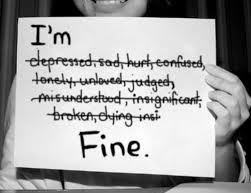Hello! We are developing a blog where people can go for information and support when experiencing depression. Our blog has information that includes helplines, recommended foods to help with depression, seasonal affective disorder, and much more. This information is all in one place! If at least one person finds this useful, then we have served our purpose! Take care!
Category Archives: Uncategorized
Did You Know?
More than 350 million people of all ages worldwide suffer from depression? Depression is the leading cause of disability worldwide……. You are not alone
Facts from www.who.into (world health)
6 Signs of Depression
http://youtu.be/51vdnwrfsNA
Magic Mushroom to Help Cure Depression
Ways Not To Think
|
Types of negative thinking that add to depression |
| All-or-nothing thinking – Looking at things in black-or-white categories, with no middle ground (“If I fall short of perfection, I’m a total failure.”) |
| Overgeneralization – Generalizing from a single negative experience, expecting it to hold true forever (“I can’t do anything right.”) |
| The mental filter – Ignoring positive events and focusing on the negative. Noticing the one thing that went wrong, rather than all the things that went right. |
| Diminishing the positive – Coming up with reasons why positive events don’t count (“She said she had a good time on our date, but I think she was just being nice.”) |
| Jumping to conclusions – Making negative interpretations without actual evidence. You act like a mind reader (“He must think I’m pathetic”) or a fortune teller (“I’ll be stuck in this dead end job forever”) |
| Emotional reasoning – Believing that the way you feel reflects reality (“I feel like such a loser. I really am no good!”) |
| ‘Shoulds’ and ‘should-nots’ – Holding yourself to a strict list of what you should and shouldn’t do, and beating yourself up if you don’t live up to your rules. |
| Labeling – Labeling yourself based on mistakes and perceived shortcomings (“I’m a failure; an idiot; a loser.”) |
Signs of a Depressed Person
Feelings of sadness and loss are normal and typically pass with time. For some people, these feelings last longer than a few days or weeks, which can seriously interfere with life. According to the National Institute for Mental Health, or NHMI, 14.8 million adults in the United States are affected by major depressive disorder, a recognized mental illness. The first step in helping a friend or family with depression is recognizing the signs of the disease.
Attitude Changes
A person who is depressed may take on an entirely different personality. The Mayo Clinic lists a common sign of depression as irritability and frustration even over the smallest things. A depressed person may lash out at those around them, be very critical or cry for no apparent reason. They may retreat from friends, family and social situations. Those close to them may notice that they no longer look forward to or participate in activities they once enjoyed.
Physical Changes
-
Depression can manifest itself in physical ways. Someone who is depressed may eat very little or binge on food as a way of finding comfort. They either lose or gain weight, sometimes dramatically and in a short amount of time. The nonprofit group HelpGuide.org also finds that people who are depressed complain of other physical ailments, such as stomachaches, backaches or headaches. These aches and pains typically have no known cause associated with them.
- Noticeable Lack of Energy
-
Everyday activities can seem like too much for a depressed person. They may appear completely out of it or dazed. Their speech, reaction time and movements may generally seem as though they are slower than usual. They also may look tired or complain of being fatigued and having no energy. According to the Cleveland Clinic, both a lack of sleep or an excessive amount of sleep are symptoms of depression.
Trouble at Work or School
-
A depressed person can have trouble concentrating, thinking and making decisions. Activities that require attention may be ignored. At work or at school, this can lead to serious problems with performance or grades. While depression can cause someone to be easily distracted, it also can lead them to become agitated and restless. A classroom or office can feel constricting and the need to leave or check out may increase.
Sad or Suicidal Speech
-
One of the most blatant signs of depression is hearing the person talk of suicide or thoughts of death and dying. In such a case, it is imminent that a friend or family member find help for them. They also may talk about feeling worthless or that life is hopeless for them. Their outlook is bleak and filled with negativity. They may bring up past events and talk about the guilt they feel over them.

Hello world!
Welcome to Sites At Penn State. This is your first post. Edit or delete it, then start blogging!




